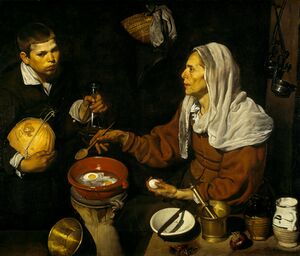Saint Philomena: Difference between revisions
(Created page with "{{WIP}} {{Infobox royalty | embed = | name = Saint Philomena. | title = Saint, Angel. | titletext = | more = | type =...") |
No edit summary |
||
| Line 98: | Line 98: | ||
| module = | | module = | ||
}} | }} | ||
Abandoned to a church orphange in Dedham | Abandoned to a church orphange in Dedham during March of 1448, '''Philomena''' (warmly refered to as "'''Mother Philomena'''") is an iconic soup kitchen owner, chef, and nun both revered and worshiped by Commoners for her selfless role in imperial history and her generous contributions to [[TECT]]'s [[Commoner Cuisine|culinary arts]]. Although proof of her existence historically is debated often, historians believe strongly in the theory that Philomena was based off an unknown woman who lived a similar life nearby Philomena's reported birthplace; regardless, records of her existance and actions have lead many others to believe in her existance as historically detailed. Philomena's signifigance to the Empire's history, culture, and culinary arts was enough to garner her immense esteem with people of all prestiges, even after her passing in 1565. To Christians, namely the Kirche der Königlich (Commoner Catholic Church) which Philomena belonged to, Philomena is revered as a Saint (canonized in 1802) and is often prayed to for guidance on morality, childcare, homecare, and culinary practices. Philomena's impact on the modern Church includes inspirations for programs, the backing of her original "Saint Philomena Congregation" (which operates soup kitchens and orphanages around the Empire), and even drawing inspiration from her actions in the past to address modern problems. In TECT Mythology, namely the cults surrounding herself and the culinary Angels, Philomena is worshiped as a Deputy Angel (often either an Angel herself or a Demi-Angel) to the Culinary Angel [[Küche]]. "Philomena des Feuerstelle", or Philomena of the Hearth as she was popularly regarded as, . | ||
Latest revision as of 19:00, 30 March 2020
This article is incomplete because it is pending further input from participants, or it is a work-in-progress by one author. Please comment on this article's talk page to share your input, comments and questions. Note: To contribute to this article, you may need to seek help from the author(s) of this page. |
| Saint Philomena. | |||||||||
|---|---|---|---|---|---|---|---|---|---|
| Saint, Angel. | |||||||||
 Saint Philomena depicted in her older years. | |||||||||
| Born | Philomena of Dedham. 22 March 1484 Dedham, Maximus State. | ||||||||
| Died | 15 April 1565 (aged 81) Dedham, Maximus State. | ||||||||
| Burial | Temple of Philomena, Dedham, Maximus State. | ||||||||
| Karlheinz of Dedham. | |||||||||
| |||||||||
| Religion | Kirche der Königlich (Commoner Catholic Church). | ||||||||
| Occupation | Soup Kitchen Operator. | ||||||||
Abandoned to a church orphange in Dedham during March of 1448, Philomena (warmly refered to as "Mother Philomena") is an iconic soup kitchen owner, chef, and nun both revered and worshiped by Commoners for her selfless role in imperial history and her generous contributions to TECT's culinary arts. Although proof of her existence historically is debated often, historians believe strongly in the theory that Philomena was based off an unknown woman who lived a similar life nearby Philomena's reported birthplace; regardless, records of her existance and actions have lead many others to believe in her existance as historically detailed. Philomena's signifigance to the Empire's history, culture, and culinary arts was enough to garner her immense esteem with people of all prestiges, even after her passing in 1565. To Christians, namely the Kirche der Königlich (Commoner Catholic Church) which Philomena belonged to, Philomena is revered as a Saint (canonized in 1802) and is often prayed to for guidance on morality, childcare, homecare, and culinary practices. Philomena's impact on the modern Church includes inspirations for programs, the backing of her original "Saint Philomena Congregation" (which operates soup kitchens and orphanages around the Empire), and even drawing inspiration from her actions in the past to address modern problems. In TECT Mythology, namely the cults surrounding herself and the culinary Angels, Philomena is worshiped as a Deputy Angel (often either an Angel herself or a Demi-Angel) to the Culinary Angel Küche. "Philomena des Feuerstelle", or Philomena of the Hearth as she was popularly regarded as, .